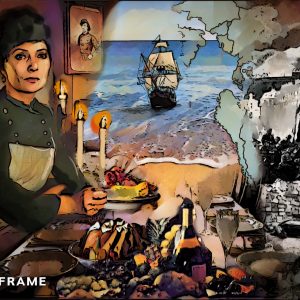New Books | How West Indians made Britain home
Drawing on archival material and interviews with those who came to Britain from the West Indies between the 1940s and 1960s, Colin Grant creates a portrait of Carribean British lives.
Author:
17 February 2021

This is a lightly edited excerpt from Homecoming: Voices of the Windrush Generation (Vintage, 2020) by Colin Grant.
I conceived of Homecoming as an excavation of the past in which I would elicit truths from simple questions about the intentions of the elders. What was the plan? What were the West Indians who migrated here in the 1950s and 1960s thinking? Can they really have set off 4 000 miles without a road – or psychological – map for where life would take them?
I began to see patterns among the answers. Most of the elders had lived in Britain much longer than they’d ever envisaged on arrival. I remembered words and ideas from past conversations with my mother. It was as if she had worked it out and provided the answers all along. Her husband, Bageye, she’d often lament in the 1960s, was a man who “like tek chance”. He was addicted to uncertainty; his friends were too. When my mother would occasionally chastise me for my own indirection in life as I turned into a man, she’d say, “You’re bluffing. C’mon now what do you really want? Right now you’re only bluffing.” The West Indians I’d admired had settled for bluff. As a child I couldn’t, at first, make out the shape and contours of their lives. Somewhere along the way, they had accepted that this is what life was: a blur, a fudge, bluff.
How, then, to delineate these lives? I imagined not a quick snapshot or a succession of Kodak moments. No, I would spend hours with them, in the comfort of their homes, and listen. I would sit with them as if I’d brought with me a huge sheet of tracing paper and we would trace and map their great adventure.
Related article:
There were many surprises. Some of the distressing landmarks which are associated with the time – the Nottingham and Notting Hill riots in 1958; the anti-immigrant Commonwealth Immigrants Act of 1962; Smethwick’s “If You Want a Nigger for a Neighbour, Vote Labour” campaign in the general election two years later; and Enoch Powell’s notorious 1968 “Rivers of Blood” speech – were not necessarily felt as viscerally by these West Indians as we might imagine today. People were too busy getting on with their lives to be distracted by hate and foolishness. West Indians might have been aggrieved and resentful about prejudice, but they were also phlegmatic. “The Englishman can’t help himself,” Bageye used to say. “It’s just his way.”
Growing up in suburban Britain back then, it felt as if West Indians and their children had been abandoned or, at best, overlooked by the mainstream, as if we were the graft that didn’t “take” to the host. In our initial headlong focus on the wisdom of assimilation, it took a while, and some nerve, to step back, to process what was going on, even, as Stuart Hall was to discover, to “turn to your blackness”. But thank God he did. Others lacked the emotional intelligence or ability or luck to be much help in navigating Britain and locating our place in it. Writers such as Andrea Levy – with works like Every Light in the House Burnin’ – dropped a stone in the great pond of English literature and created a ripple to show we existed, if only for a while. It may have been my own ignorance and narrow-mindedness, but I did not want to read what white but sympathetic British writers like Colin McInnes had to say. I didn’t hold out much hope for a nuanced depiction of the zoot-suited Black spivs in 1950s Notting Hill whom he depicted in City of Spades. A more attractive and resonant work came with Sam Selvon’s sad but funny reflections on early West Indian migrants in Lonely Londoners. And I often wondered what would have become of his characters, Moses, Tanty and Sir Galahad, if their stories were updated today. That question animated the research for this book. I hope readers will find the glow of their afterlives here, in these pages.
Related article:
If I felt any resistance from potential interviewees during the compilation of this book, I’d always enlist the support of Chinua Achebe. In fact, he often came up in interviews anyway. Achebe once commented on the importance of storytelling for Black people who have been marginalised in mainstream cultures: “Until the lions have their own historians then the story of the hunt will always glorify the hunter.” In this book there are many lions and lionesses, and they are all telling their extraordinary stories and unashamedly “chatting their business”.
In addition to these new interviews, to create a tableau of West Indian life in Britain, I draw on my personal archive of interviews amassed over the last 20 years. They are woven into the text alongside other richly rewarding sound archives from institutions like the British Library and the BBC, as well as other discrete oral history projects begun in places such as Leeds and Manchester, and individual collections, like those accrued by the filmmaker and DJ Don Letts, and the writer and artist Michael McMillan for his “The West Indian Front Room” installation. I also follow the paths of other writers like Andrea Levy, Stuart Hall, VS Naipaul and, of course, Derek Walcott. I’d forgotten about Walcott’s great poem, Home coming: Anse la Raye, when I was searching for a title for this new book. Retrospectively, I was struck by Walcott’s lines: “but never guessed you’d come / to know there are homecomings without home”.
I’d assumed the St Lucian poet was considering the nature of return to the Caribbean literally after such a long time abroad. But, actually, his canvas is much bigger. Home is not home; home is elsewhere. Walcott is talking metaphorically and universally. “I don’t think we ever have complete homecoming,” Walcott later explained. “There is always a little extra left that we need to occupy, or something to contradict the elation of being home.” That same sentiment – the complicated elation of being home – was expressed by many of the people I interviewed for this book. On setting out from their British colonies in the Caribbean to come “home” to Britain in the 1950s and 1960s, they never felt that they’d fully arrived.


